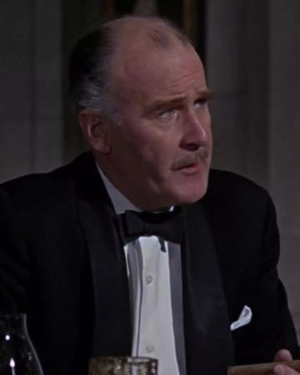Aging is one of those things we tend not to think about until it happens to us and then it's troubling to say the least. This is not the 20th century anymore when being 39 was almost literally the middle point of your life and, as this piece on Unilad on James Bond's release of "Goldfinger" draws attention to through actor Richard Vernon who was (shockingly) only 39 when he (an actor and supposedly benefiting of special lighting, make up and, when off-screen, a good life) looked at age 39 like this:

Featured Image Credit: United Artists
Getting older now is not equated with being old provided, of course, we take the time to understand what it is we have to do and are willing to put in the effort to do it.
Usual AMA rules apply here: try and keep your questions as much as possible on point with the subject. Ask anything that you want to know. As always, there are no stupid questions and you can follow up any of my answers with more questions. I will acknowledge your question by Liking it and reply, usually within an hour or so after Liking it and roughly within 24 hours of you having asked it. The thread will be open for twenty days and it will close on 21st April.
As always, I will bring research to my answers and link to it.
This is a sweeping subject with many layers. In many ways had I known what I know now when I was 25 I'd be in a much better stage of fitness and health. I will open this thread to questions on April 1st as promised. Unlike previous AMAs however I am posting a little earlier because there is material I would, ideally, want you all to have in mind:
1. Our guide on How To Age Slowly
2. A video testimonial on what I currently do to stay younger
3. A video testimonial on my approach to nutrition
4. The three pillars of fitness (these are key to fighting age and I will talk about them extensively here)
5. Finally, three anti-aging exercises you need to keep in mind for yourself. Your ability to perform them or at least train for them is critical.
All this should give sufficient material to see you through the weekend so on Monday, when I open this thread to your questions you will all be primed (I hope). See you all on the other side of the weekend!

Featured Image Credit: United Artists
Getting older now is not equated with being old provided, of course, we take the time to understand what it is we have to do and are willing to put in the effort to do it.
Usual AMA rules apply here: try and keep your questions as much as possible on point with the subject. Ask anything that you want to know. As always, there are no stupid questions and you can follow up any of my answers with more questions. I will acknowledge your question by Liking it and reply, usually within an hour or so after Liking it and roughly within 24 hours of you having asked it. The thread will be open for twenty days and it will close on 21st April.
As always, I will bring research to my answers and link to it.
This is a sweeping subject with many layers. In many ways had I known what I know now when I was 25 I'd be in a much better stage of fitness and health. I will open this thread to questions on April 1st as promised. Unlike previous AMAs however I am posting a little earlier because there is material I would, ideally, want you all to have in mind:
1. Our guide on How To Age Slowly
2. A video testimonial on what I currently do to stay younger
3. A video testimonial on my approach to nutrition
4. The three pillars of fitness (these are key to fighting age and I will talk about them extensively here)
5. Finally, three anti-aging exercises you need to keep in mind for yourself. Your ability to perform them or at least train for them is critical.
All this should give sufficient material to see you through the weekend so on Monday, when I open this thread to your questions you will all be primed (I hope). See you all on the other side of the weekend!

 from
from
 from
from
 But it is needed to explain well. It was very clear and very complete.Tthe article about sarcopenia is very interesting but too much scientific for me. I was not able to be sure if we know why ( i think that it is not clear). I am wondering, if we don't know why, do we know if it is possible to get back the lost muscles (or even more, i think so), and if there is a most important thing to do ? train more, harder, eat more protein, rest more ?
But it is needed to explain well. It was very clear and very complete.Tthe article about sarcopenia is very interesting but too much scientific for me. I was not able to be sure if we know why ( i think that it is not clear). I am wondering, if we don't know why, do we know if it is possible to get back the lost muscles (or even more, i think so), and if there is a most important thing to do ? train more, harder, eat more protein, rest more ?

